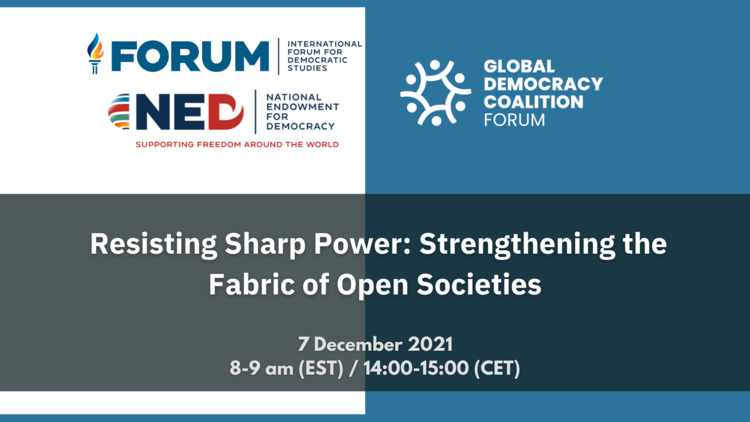Ahead of the Summit for Democracy, researchers and civil society activists from around the world will share research and expertise on combating authoritarianism, including NED’s evolving work on authoritarian influence and the release of a new web portal featuring research and analysis designed to help activists, researchers, and journalists better understand, recognize patterns, and respond to this phenomenon. The discussion will focus on civil society-led approaches and tools to accelerate learning about the impact of sharp power on the public sphere, especially in young and emerging democracies that these panelists represent. Panelists will also identify opportunities—across regions and outside of the context of advanced democracies—for strengthening democratic resilience in these contexts. This conversation will take place as part of the Global Democracy Coalition Forum, a diverse multistakeholder civil society-led platform convened by International IDEA to galvanize a global conversation on democracy.
FEATURING
Dominika Hajdu, GLOBSEC (Slovakia)
Ttcat, Doublethink Lab (Taiwan)
George Sarpong, National Media Commission (Ghana)
Jessica Ludwig, International Forum for Democratic Studies (USA)
WITH REMARKS BY
John Glenn, International Forum for Democratic Studies
MODERATED BY
Kevin Sheives, International Forum for Democratic Studies
ABOUT THE PARTICIPANTS
John K. Glenn is senior director of the International Forum for Democratic Studies, the research and analytical section of the National Endowment for Democracy (NED). Glenn has an extensive background working at the intersection of international affairs and democratic development, most recently as policy director at the U.S. Global Leadership Coalition (USGLC). He oversees and develops the Forum’s cross-cutting analytical and research activity in areas including transnational kleptocracy, the integrity of the information space, emerging technology, and sharp power and authoritarian influence. Prior to joining USGLC, Glenn served as director of foreign policy at the German Marshall Fund.
Dominika Hajdu is the head of the Centre for Democracy & Resilience at GLOBSEC. GLOBSEC is a think tank based in Bratislava, Slovakia that is committed to enhancing security, prosperity and sustainability in Europe and around the world. Hadju’s work at the Centre for Democracy and Resilience focuses on defending democracy against subversive efforts aiming to undermine it, as well as the examination of strategies, actors and tools utilized in information operations. In her research, she focuses on the impact of information operations and social media on a democratic society; cognitive security; and strategic communication of the public sector. In her current capacity, she has led several international research, awareness-raising and capacity-building projects for various target groups aiming to build societal and state resilience.
Jessica Ludwig is a senior program officer at the International Forum for Democratic Studies, the research and analytical section of the National Endowment for Democracy (NED). In this capacity, she serves as editor of the Power 3.0 blog and producer of the Power 3.0 podcast. Her research focuses on authoritarian influence in emerging democracies, with a particular interest in China and Russia’s engagement with Latin America. Ludwig is coauthor (with Christopher Walker) of the report, A Full-Spectrum Response to Sharp Power: The Vulnerabilities and Strengths of Open Societies, and coeditor (with Christopher Walker) of the report, Sharp Power: Rising Authoritarian Influence (NED’s International Forum for Democratic Studies, 2017). Her writing has been published in Foreign Affairs, Foreign Policy, Global Americans, and the Journal of Democracy.
George Sarpong is a lawyer, journalist, and recognized industry leader in media and communications policy in Ghana. He currently serves as executive secretary of Ghana’s National Media Commission, which oversees more than 360 radio stations, 80 registered newspapers, 25 television channels, and various online publications. As executive secretary, he initiates and implements policies to ensure free, responsible, pluralistic, and diverse media and also works to address threats to media freedom and development. Before joining the National Media Commission, Sarpong served as coordinator of publications at the Media Foundation for West Africa, where he organized programs for the defense of journalists in West Africa. In 2001, he founded the Youth Network for Human Rights and Democracy (you-net) to train young Ghanaians in leadership and good governance, and in 2010 he set up the Party Youth Forum to foster peaceful cooperation among youth from different political parties. In 2018-2019, he was a Reagan-Fascell Democracy Fellow at the National Endowment for Democracy’s International Forum for Democratic Studies.
Kevin Sheives is associate director of the International Forum for Democratic Studies, the research and analytical section of the National Endowment for Democracy (NED). He has helped lead the Forum’s research and convening in areas such as the integrity of the information space, authoritarian influence and sharp power, transnational kleptocracy, and emerging technologies’ impact on democracy. Sheives joined the Forum in August 2020. For nearly fifteen years, he served as a manager and advisor at State Department offices leading U.S. diplomatic and governmental responses to strategic competition with China, global disinformation, and the Asia-Pacific’s rise. He also served in roles at the Defense Department, the office of the U.S. Trade Representative, and Congress.
Ttcat (Min Hsuan Wu) is the co-founder and CEO of Doublethink Lab, a Taiwan-based organization that operates at the intersection of the internet, public discourse, civil society, and democratic governance. Doublethink Lab is researching modern threats to democracy and devising strategies to counter them. He is focused on mapping China’s online information operation mechanisms and facilitating the global CSO network to combat digital authoritarianism. Over a decade and a half, Ttcar has committed to LGBTIQA+, environmental, open government, civic tech, and the digital rights movement as an activist and campaigner.

